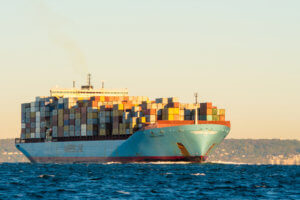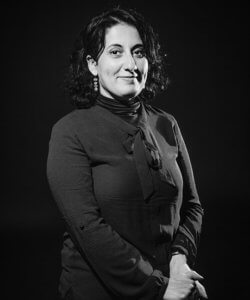The Monmouth University Institute for Global Understanding (IGU) and Urban Coast Institute (UCI) hosted “Global Perspectives on Adapting Marine Shipping Governance and Maritime Sovereignty to Respond to Climate Change” on Feb. 19, 2021. The event was part of the IGU-UCI Global Ocean Governance Lecture Series, which assembles international experts to discuss scientific and policy issues that hold important implications for coastal and marine ecosystems. The discussion was moderated by Professor Randall Abate, director of the IGU, and included the following presentations and speakers:
 “Climate Change and Global Marine Shipping Governance,” by Beatriz Martinez Romera, University of Copenhagen (Denmark)
“Climate Change and Global Marine Shipping Governance,” by Beatriz Martinez Romera, University of Copenhagen (Denmark)- “Applying the Atmospheric Waqf Principle in Muslim Countries to Promote Nature’s Trust in the Marine Environment,” by Samira Idllalène, Cadi Ayyad University (Morocco)
- “Maritime Sovereignty of Submerged Pacific Islands,” by Joanna Siekiera, University of Bergen (Norway)
Abstracts & Bios
Climate Change and Global Marine Shipping Governance
ABSTRACT: If they could be accounted as a country, greenhouse gas emissions from maritime transport would be one of the world’s top 10 emitters. Moreover, shipping emissions are forecast to increase 50-250% by 2050 and the contribution of shipping to climate change will further intensify, as routes in the Arctic become available. In spite of this, shipping remains largely unregulated, being the last sector of the economy to contribute to climate change mitigation targets in line with the Paris Agreement. This presentation will examine the legal and regulatory frameworks of the United Nations Framework Convention on Climate Change (UNFCCC) regime, the International Maritime Organization, and the role of the European Union in regulating climate-related impacts from shipping.

PRESENTER BIO: Dr. Beatriz Martinez Romera is associate professor of environmental and climate change law at the University of Copenhagen Faculty of Law. Martinez Romera has a keen interest in the international climate negotiations, and the regulatory processes at the International Civil Aviation Organization and the International Maritime Organization, as well as the developments at the EU level. Her research includes environmental and climate change law and policy; aviation and maritime transport sectors; law-making processes at international and EU levels; environmental taxation, carbon pricing and related fiscal measures; renewable Energy; fragmentation of international law and regime interaction; environmental and climate-related regulation of the Arctic; ocean governance; and corporate environmental responsibility. She has been teaching climate change law for the last 10 years, and is the founder of TRAMEREN (Transatlantic Maritime Emissions Research Network with NYU School of Law) and ArcEnGov (Arctic Environmental and Climate Change Governance Network with Canadian Research Institutions).
Applying the Atmospheric Waqf Principle in Muslim Countries to Promote Nature’s Trust in the Marine Environment
ABSTRACT: The public trust doctrine is an important legal tool used in common law countries. It imposes limits on governmental action and provides public access rights to trust resources. The public trust doctrine is grounded in common law principles as it stems from the principle of the trust. This principle exists also in Islamic law. The public trust doctrine provides a legal framework for protecting maritime resources and the global climate system. Around the world, climate change litigation is based on the principle of the public trust (atmospheric trust litigation). Comparatively, in Muslim countries, the principle of the trust (called Waqf) has fallen into disuse for political and historical reasons. A revival of the trust in Muslim countries in the Middle East and North Africa (MENA) region and Indonesia can benefit from a comparative law perspective (common law and Islamic law). A closer analysis of Waqf can reframe the environmental legal system and enhance international efforts for environmental action. Therefore, Islamic environmental law could find synergistic opportunities at the global level in the growth of the spiritual ecology movement (Eco-Islam) and at the domestic level in conjunction with Islamic finance. This paradigm shift is urgent and necessary to protect marine resources, especially given the stresses that the marine environment is experiencing from climate change impacts.

PRESENTER BIO: Dr. Samira Idllalène is a professor of law at Cadi Ayyad University at the polydisciplinary Faculty in Safi, Morocco. She teaches environmental law, law of the sea, international law, and comparative law. She is the author of several publications in coastal environmental law in Morocco. Idllalène was a visiting associate professor at the University of Oregon School of Law as part of a Fulbright grant. She also has taught marine environmental law at the Higher Institute of Maritime Studies (Casablanca) as part of the Advanced Cycle in Maritime Affairs in collaboration with the University of Quebec in Rimouski (Canada). Idllalène is member of the Jury: Trophy of Her Royal Highness the Princess Lalla Hasnae “Sustainable Coastal Zone” (Littoral durable) and board member of the Moroccan Association for the Protection of the Underwater Cultural Heritage. She is a partner with Environmental Law Alliance Worldwide (ELAW) and pro bono legal consultant in environmental law for several Moroccan NGOs and for the Economic, Social and Environmental Council (CESE) and the National Fisheries Research Institute (INRH). Idllalène holds a Ph.D. in marine environmental law from the University of Western Britanny in Brest (France), a master’s degree in maritime studies from the same university, and a degree in comparative law from the International University of Comparative Law (Strasbourg-France).
Maritime Sovereignty of Submerged Pacific Islands
ABSTRACT: Global climate change scenarios are seen as future concerns, but this is not the case for the Pacific island countries and territories (PICT). The natural sciences have already built substantial knowledge about the oceanographic, geological, and atmospheric processes associated with global warming and ocean change. Nonetheless, input from the social sciences and the law needs to be collected, analyzed, and executed to determine what happens when climate change impacts threaten the viability of sovereign states. Small island developing states (SIDS) contribute the least to global climate change, yet they are suffering the most from its effects, while the legal consequences of losing the most or all of their territory will threaten loss of sovereign status for those states in the international arena. As the largest water basin on Earth, the Pacific Ocean remains an isolated region in terms of geopolitics and research. This presentation examines the future of the Pacific states regarding their recognition as equal entities among other sovereign states and offers some international law proposals on this issue. The presentation also seeks to sensitize European and American audiences to certain issues of the geographically remote South Pacific that may eventually have impacts for the global community. Threats to human security, food security, land security, and statehood will also be addressed.

PRESENTER BIO: Dr. Joanna Siekiera is an international lawyer and doctor of social sciences in public policy sciences. Since 2019 she has worked as a postdoctoral fellow at the University of Bergen. She was a scholarship holder of the New Zealand Government at the Victoria University in Wellington in 2015-16. She defended her doctoral thesis in 2017 at the Collegium of Socio-Economics of the Warsaw School of Economics in Poland on regional policy of the states in the South Pacific. Siekiera researches public international law, the law of the sea, and (ocean) science diplomacy. Her specialization is legal and political relations in the South Pacific. She works as a legal adviser on the Research Council of Norway grant “Mare Nullius” at the Bergen Pacific Studies Research Group. Her work on this project focuses on the legal consequences of ocean change and sea level rise on the sovereignty of states in the Pacific. Siekiera is the author of over 80 scientific publications in several languages, as well as co-author of three monographs. She is a participant in 11 scientific grants from the European Union, Norway, and Poland and is a co-investigator on the Worldwide Universities Network grant.
